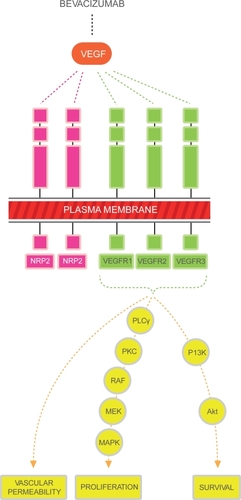Figures & data
Figure 1 The major mediator of tumor angiogenesis is the vascular endothelial growth factor (VEGF) family of growth factors. The VEGF family binds to the VEGF receptors (VEGFR)-R1, VEGFR-2, VEGFR-3 tyrosine kinase as shown in figure. Neuropilin (NRP 1 and 2) are co-receptors for the VEGFRs and lack tyrosine kinase activity. The binding of VEGF to the VEGF receptors results in activation of the intracellular pathways. Activation of the PLC-PKC-raf kinase-MEK-mitogen activated protein kinase pathway results in increased cell proliferation. Activation of the phosphatidylinositol 3′-kinase (P13K), akt pathway leads to increased cell survival.

Table 1 Initial phase II trials of bevacizumab in metastatic colorectal cancer
Table 2 Selected randomized studies of bevacizumab in first-line metastatic colorectal cancer
Table 3 Current adjuvant studies utilizing bevacizumab in colorectal cancer
Table 4 Adverse events in selected trial of bevacizumab in colorectal cancer
Table 5 Common terminology criteria for adverse events v3.0 (CTCAE)Citation109